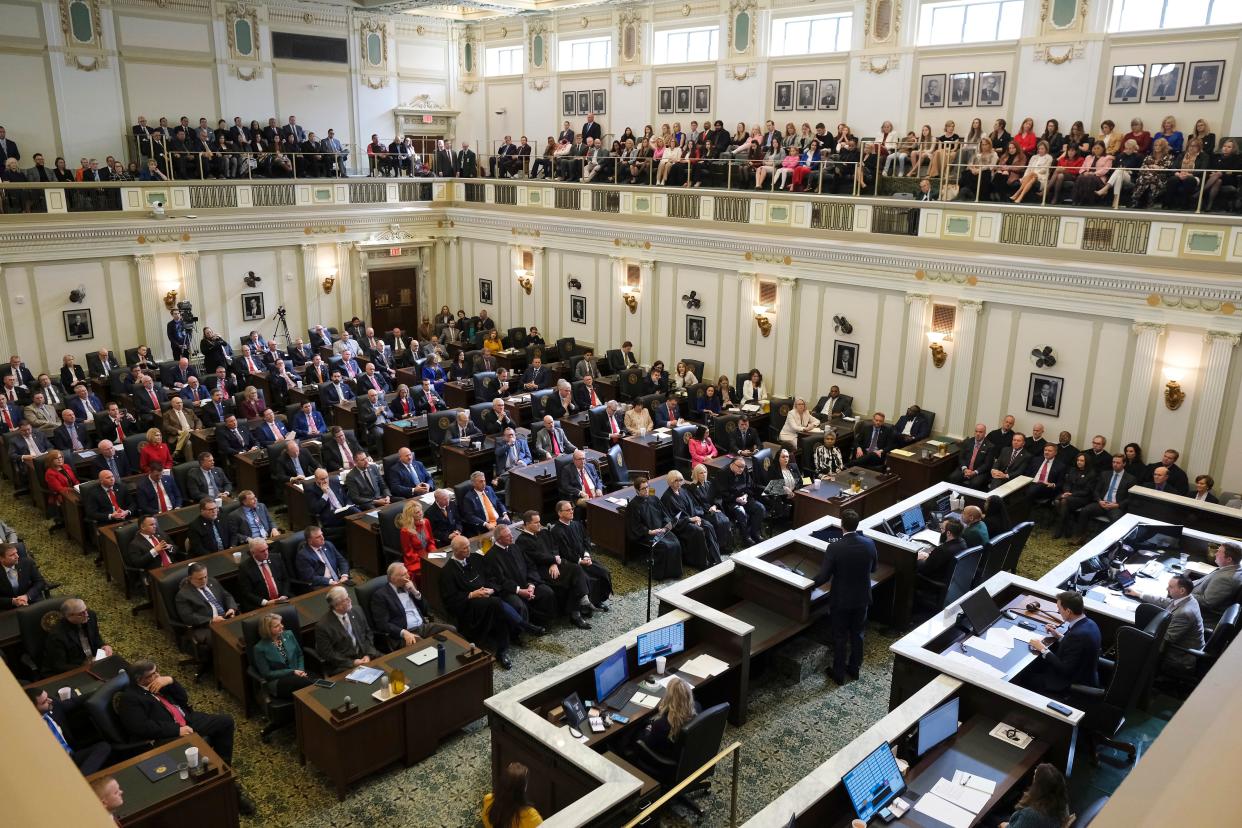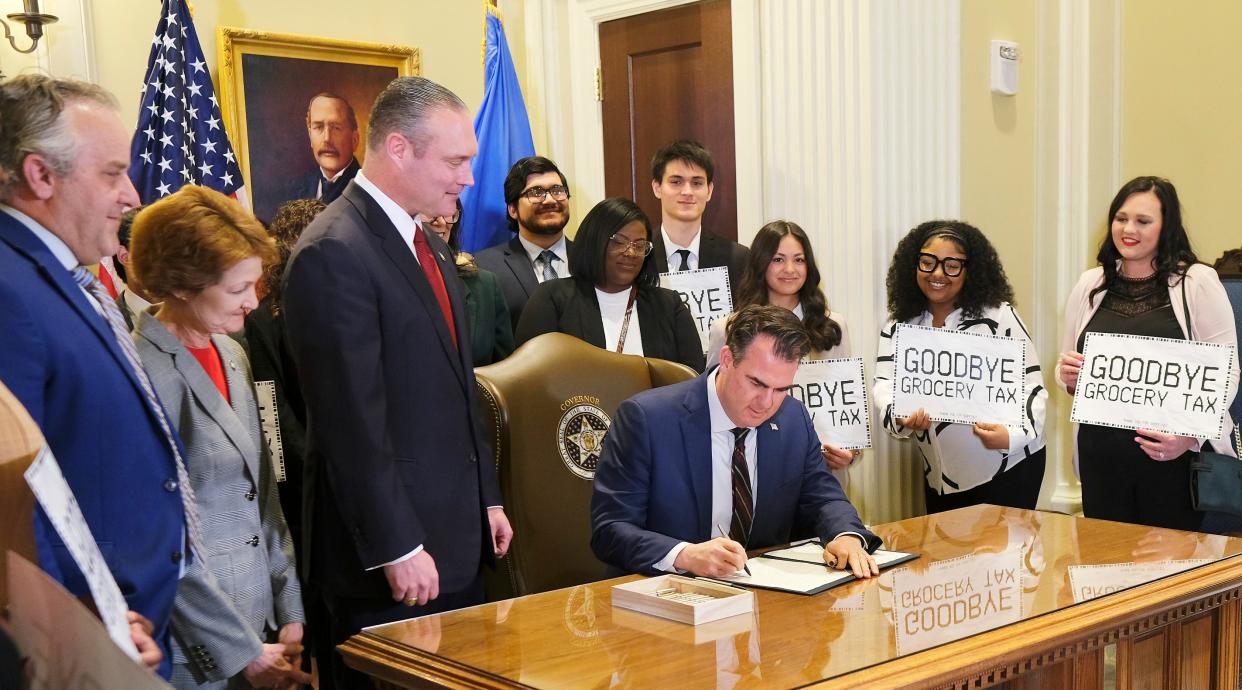Immigration, graduation and a tax cut: 10 of the biggest bills this legislative session

Many Oklahomans cheered action by the state Legislature this year to repeal the grocery tax, providing at least some relief from inflation. But others expressed concern about a new law threatening state arrest and prosecution of those in Oklahoma without proper immigration documents.
The tax and immigration laws were among 354 (as of Thursday) approved during the 2024 legislative session, according to Quorum Call, a legislative tracking and news website.
Three laws took effect without Gov. Kevin Stitt's signature, and 21 were vetoed by the governor. The Senate overrode one of those vetoes, but the House did not follow suit. More veto action is possible.
Here are details about the 10 bills considered by the Legislature this year that drew the most interest and controversy.
Grocery tax provides some relief for Oklahoma consumers
Oklahomans will pay a little less at the grocery store beginning in late August with the elimination of the state’s portion of the grocery tax. It’s the single largest tax cut in state history at more than $400 million when fully implemented. The state’s portion, 4.5%, equals about $3.83 on an $85 grocery bill.

Data from the U.S. Census Bureau shows Oklahomans spend an average of about $279.16 per week on groceries. The new tax cut will affect prepared food and food that is taken home and prepared. On-site meals such as deli food don't qualify.
Depending on where you live, city sales/use taxes can be as high as 5.5%, plus county sales taxes of up to 2.5%, a study by the Oklahoma Policy Institute noted. The new law prohibits municipalities from raising their retail sales taxes until June 30, 2025.
More: How will the Oklahoma grocery tax cut actually affect my bill? What to know
Anti-immigration law raises concern despite legal challenges
An anti-immigration law that has angered many Oklahomans and is being challenged by both the federal government and the American Civil Liberties Union was signed by Gov. Stitt in April. The bill was moved along by legislative leaders with little discussion and is effective July 1 unless stopped by court action.

The bill establishes “impermissible occupation” as an Oklahoma crime and calls for fines, jail and removal from the state of people without proper legal documentation. Fines increase and prison terms are involved if a second offense is committed. Attorney General Gentner Drummond said he requested the legislation to address illegal marijuana-grow operations, but the law is under fire for vague language and concern about fair enforcement.
Rep. Annie Menz, D-Norman, said supporters of the new law didn’t think through its economic ramifications, adding that the state takes immigrant labor for granted. She noted that almost everyone had been touched by migrant labor in comments on Hispanic Cultural Day, when a large rally was held in opposition to the bill. “Make them hear you," she said.
Opinion: Oklahoma Republicans passed a law that police chiefs don't want to enforce
Oklahoma City Police Chief Wade Gourley said immigration status is not routinely checked by his department and that enforcement of the law would be a burden. He said the department has spent years building relationships by attending community meetings, events, festivals and visiting schools, but the new law could negatively impact those connections, setting them back to Square One. Gourley's concern about enforcement difficulty was echoed by other chiefs of police.
Assisting domestic violence victims who defended themselves
The Oklahoma Survivors Act was designed to assist victims of domestic violence forced to defend themselves against abusers. Rep. Jon Echols, R-Oklahoma City, and Senate Pro Tempore Greg Treat, authored a revised version of the legislation after the first was vetoed by the governor as being "too broad." The bill becomes effective 90 days after the legislative session adjourns.
The new law requires judges to add domestic violence to the list of mitigating factors that are often considered in criminal trials, possibly making a defendant eligible for lighter sentencing. Physical, sexual and psychological abuse were already included on the list.
A court can impose a new, lesser sentence after a hearing if the court determines the defendant was a victim of domestic violence at the time of the offense and the violence or abuse was related to and a substantial contributing factor in causing the defendant to commit the offense. At the hearing, courts can take testimony from witnesses offered by either party, consider relevant evidence and consider oral and written arguments.
More: 'A beacon of hope': Newly signed bill moves the needle on helping victims of domestic violence
Victims who are currently incarcerated can submit a request to apply for resentencing.
Angela Beatty, YWCA vice president, said, “Oklahoma prisons are full of women who ultimately were put in a position of having to protect themselves. I think this bill will offer them the opportunity to petition the court for some relief.”
New state graduation standards
Rep. Rhonda Baker, R-Yukon, led a rewrite of Oklahoma’s high school graduation standards in HB 3278, considered one of the most impactful legislative pieces in a generation. She and other education leaders talked to superintendents of large and small districts, site principals, business leaders and higher education representatives to address workforce and academic needs.
Baker said the concept behind the bill is to better prepare Oklahoma students for whatever post-secondary path they choose, be it college, CareerTech, the military or simply entering the workforce.
“Every kid has a different story,” Baker said. “That’s the beauty of what we’re trying to do. We’re trying to make it to where we are helping them with their story. We’re trying to make it more relevant to them. The relevance is key because they do have their own story.”
The new system still would require 23 overall credits for graduation but would increase the math requirement to four credits. Baker said that’s something about which those in higher education and the business community felt strongly, so students wouldn’t potentially have a year of high school with no math instruction before entering college or the workforce. Now local school boards can determine what might count as a math class — such as a welding course or a robotics class, since those courses require significant amounts of math — if those courses are approved to qualify as such a credit by the Oklahoma State Department of Education.
The new system also would add six “pathway” credits that could be determined by local school boards, again with the approval of the state Education Department. The idea is for those pathway credits to align with each student's Individual Career and Academic Plan (ICAP) — which is developed while a student is in junior high and provides indicators about the student’s potential academic strengths and interests.
Not everyone was in favor of all the changes. Proponents of fine arts classes — such as band, choir and drama — said they worried that removing the current requirement that every student take at least one of those classes would cause enrollment in those classes to plummet. The same goes for those connected with world language classes.
Teachers could see a raise
Some Oklahoma teachers could see a salary increase with approval of the “Teacher Empowerment Fund.” The fund, which was approved last year by the Legislature, receives state lottery money. It provides for raises of between $3,000 and $10,000 for teachers identified by their districts as “advanced,” “lead” or “master” teachers. No more than 10% of any district’s teachers can be chosen for the empowerment program.
Sen. Adam Pugh, R-Edmond, who authored the bill, expressed concerns about the amount of money some school districts were keeping as fund balances in their accounts and what might happen when the $22 million allocated for the program expires. The law is effective on July 1.
Opinion: Systemic racism, poverty to blame for state of OKCPS, not unruly kids | Teacher
Pugh, chairman of the Senate Education Appropriations Subcommittee, also expressed concern with the lack of school districts taking advantage of the program. During that hearing, state schools Superintendent Ryan Walters testified only about $225,000 of the $22 million has been used and said only 12 of the state’s more than 500 school districts had applied for the program.
Private school voucher program gets a fix
Oklahoma parents who use the private school tax credit should see the full amount applied to their child’s tuition after a new law was signed by Gov. Stitt. This law was effective immediately.
KFOR reported in March that parents received emails notifying them that part of the tax credit they received was applied to taxes and other debts, then the remainder was used for tuition.
More: Nearly $2M in school choice tax credits were spent on parents' debt instead
That’s not the case anymore. The Senate's leader, Treat, House Speaker Charles McCall, R-Atoka, and Rep. Chad Caldwell, R-Enid, authored a bill to prevent the Oklahoma Tax Commission from applying the credits to unpaid taxes, delinquent tax liabilities or other unpaid debt.
Emily Haxton, public information and press liaison for the Tax Commission, told The Oklahoman the law needed to be changed because when the program was first approved the deductions to the credit were required.
Mason Treat Act changes car tag rules
Senate Bill 2035, named the Mason Treat Act by the House of Representatives, was signed by Stitt. Rep. Kyle Hilbert, R-Bristow, joined Treat on authoring the legislation, and the law will be effective Sept. 1.
The legislative proposal was developed after Mason, the pro tempore's 16-year-old son, was critically injured in a car accident. The teenager was stopped by Deputy Sheriff Jose Tayahua-Mendoza while driving a newly purchased vehicle, which did not display a car tag. While he was pulled over, the driver of a commercial pickup hauling a trailer full of steel fell asleep and veered off the road and slammed into the back of Mason Treat's car, severely injuring him and the deputy sheriff.
Under the bill, effective in September, motor vehicle license plates will remain with the vehicle to which they were initially registered. The bill repeals a statute authorizing the transfer of a license plate to a different vehicle and requires a public awareness campaign to inform residents of the changes.
The new law allows individuals purchasing motor vehicles in a private sale to print a temporary tag to place on their vehicle after proper documentation is submitted to Service Oklahoma.

The new law does not affect tribal tags.
Aid for tornado-affected communities
At least 40 tornadoes have hit Oklahoma since the 2024 season started, including several destructive twisters that left devastation, injuries and death in their wake. Legislators acted to get those communities back on their feet, with Rep. Kevin Wallace, R-Wellston, and Sen. Chuck Hall, R-Kingfisher, authoring the bill. The law is already in effect.
"It is now a very high priority to make sure that there's adequate funding for emergency management," Sen. Greg McCortney, R-Ada, said earlier this spring. "The biggest thing that we, as the Legislature, can do is make sure that we have the money set aside to help these communities rebuild. It will be a partnership between ... the state and the federal government. That means there's going to be some changes made to the budget that the House and Senate have both presented."

Stitt signed two House Bills to help with disaster relief, Oklahoma Voice reported. The first creates a new fund for the Oklahoma Department of Emergency Management to offer loans to local governments that have been approved for FEMA disaster aid. It should help cover various costs, including temporary housing, infrastructure repairs, debris removal and other efforts. It also can be used to help meet the local match. The second bill totals $45 million in disaster relief, and it helps the state fund meet the state’s required match to qualify for FEMA aid.
Changes in liquor laws for employees
The governor signed Senate Bill 2001, allowing straw testing and formalizing emergency rules created by the ABLE Commission. Sen. Bill Coleman, R-Ponca City, and Rep. Neil Hays, R-Checotah, authored the legislation. The law is in effect.
The bill modernizes Oklahoma's liquor laws to prevent unnecessary fines and citations against local restaurants, bars, retail establishments and bartenders. Tasting drinks, often a part of educating staff members so they can make recommendations to patrols, was previously previously considered illegal under Oklahoma law and punishable by fines.
The new law also allows for retail spirits, wine or beer license holders to "host alcoholic beverage tastings," as well as for mixed beverage, beer and wine, bottle club, caterer, charitable event, public event or special event licensees to host "employee educational tastings," according to the specific standards set forth in the law.
Oklahoma businesses can use discretion in checking IDs for alcohol purchases
House Bill 3571, or Odell's Law, removes the requirement for businesses to check IDs before serving alcohol and allows businesses to use their discretion. Rep. Robert Manger, R-Oklahoma City, and Sen. Darrell Weaver, R-Moore, authored the bill, which becomes effective Nov. 1.
“I authored House Bill 3571 after a friend of mine, who recently turned 90, was denied a beer because he didn't have his ID,” Manger said. “Odell's Law would remove the cumbersome requirement to check somebody’s ID before selling them alcohol, allowing people over the legal drinking age to purchase alcohol even if they've forgotten their ID or don’t wish to show it. HB 3571 does not prohibit a company policy that requires ID verification. This is common sense legislation.”
Weaver said businesses will still be held responsible if they serve alcohol to minors.

Contributing: Staff writers Scott Carter, Murray Evans and JaNae Williams
This article originally appeared on Oklahoman: Immigration, taxes: 10 major bills in Oklahoma legislative session
